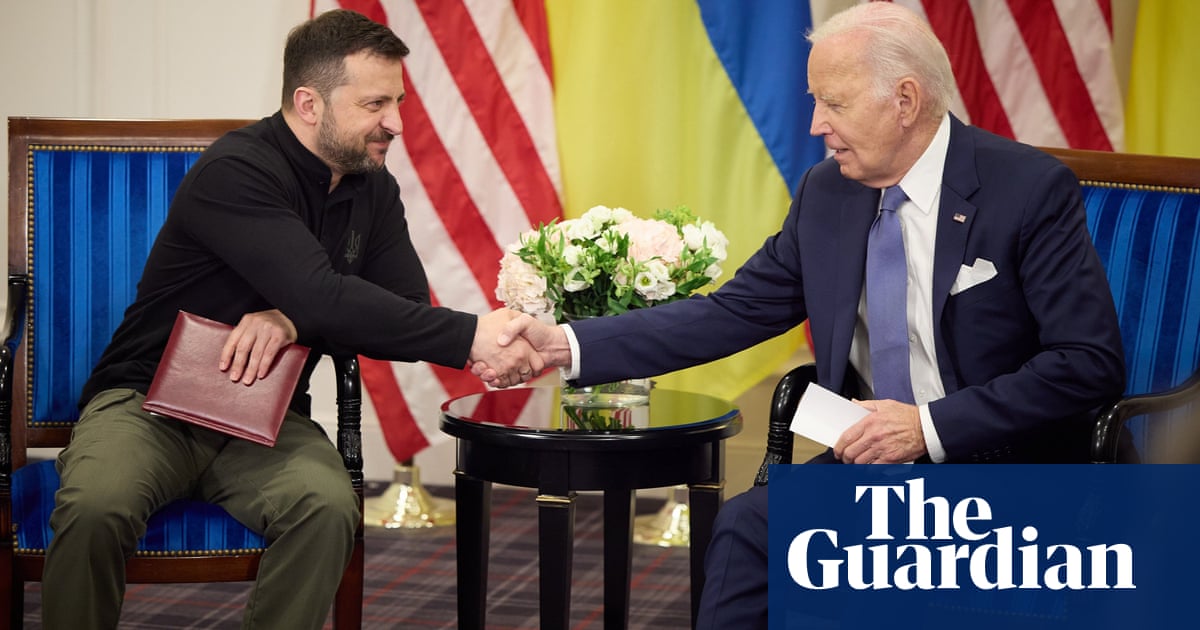World
US and Ukraine to sign 10-year security agreement at G7 summit

Joe Biden and Volodymyr Zelenskiy will sign a 10-year bilateral security agreement at the G7 summit in Italy, as arguments continued on the sidelines about how the west can provide a Donald Trump-proof $50bn loan to Ukraine.
Kyiv has signed 15 bilateral security agreements with other countries since the full-scale Russian invasion began in 2022, including with the UK, France, Germany and Italy. The US-Ukraine agreement does not require the authorisation of Congress and could be undone by a future Trump administration. Biden has said previously that guarantees for Ukraine would be equivalent to those to Israel, covering financial and military assistance as well as the possibility of the joint weapons production.
The two leaders will hold a press conference later on Thursday, where differences over a timetable for Ukraine’s bid to join Nato and the introduction of foreign military trainers inside Ukraine are likely to be on view. The bilateral agreements have been seen in Ukraine as a stopgap on the road to joining Nato.
Ukraine will also sign a bilateral deal with Japan on Thursday.
“The document with the United States will be unprecedented, as it should be for leaders who support Ukraine,” Zelenskiy said.
As with the other bilateral pacts, the agreement with the US will not require America to come to Ukraine’s defence if attacked. But it could make it easier for Ukraine to enter into peace negotiations with Russia, as Kyiv would have some assurance about the help it would receive in the event of a further Russian attack.
Ukraine has had bitter experience of such agreements. Signatories to the Budapest memorandum in 1994, which called for respect for countries’ independence and sovereignty, did not come to Ukraine’s defence when Russia annexed Crimea in 2014.
The bilateral security agreements state that in the event of a future Russian attack against Ukraine, the parties will consult within 24 hours to determine measures to counter and deter the aggression. A future attack is not defined.
Previewing the US-Ukraine bilateral agreement, the US national security adviser, Jake Sullivan, said: “By signing this, we’ll also be sending Russia a signal of our resolve. If Vladimir Putin thinks that he can outlast the coalition supporting Ukraine, he’s wrong. He just cannot wait us out, and this agreement will show our resolve and continued commitment.
“Through this agreement, we’re also securing commitments from Ukraine on reforms and on end-use monitoring for weapons we provide.”
Sullivan emphasised that Ukraine had lessons for the US military, including in the use of drone warfare. In deepening cooperation with Kyiv, Sullivan said the US would “benefit from Ukraine’s insights and experience, its battlefield innovations and its lessons learned from the front”.
Leo Litra, visiting fellow at the European Council on Foreign Relations, said it was important to be clear about the limitations and purpose of the security guarantees. “The security cooperation agreements are designed to make support for Ukraine predictable and quantifiable, but they do not come close to providing instruments that could substitute Nato’s article 5 on collective defence,” Litra said.
Relations between Biden and Zelenskiy are improving, with Biden apologising for the delay in getting extra cash for Ukraine through Congress and pleasing Kyiv by finally agreeing it was legitimate to hit military targets inside Russia responsible for attacking Kharkiv.
Zelenskiy will also be grateful for the large sanctions package announced by the White House on Wednesday designed to close loopholes used by financial institutions trading with Russia. The US justifies broadening sanctions on the basis that Russia has turned its entire economy over to a war economy.










